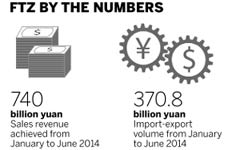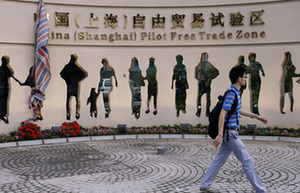Financial reform in the China (Shanghai) Pilot Free Trade Zone needs to speed up, especially when it comes to opening up the capital account and liberalizing the exchange rate, said an expert involved in the official evaluation of the pioneering zone.
Chen Bo, secretary-general of the FTZ Institute at the Shanghai University of Finance and Economics, said that the slowest part of reform in the FTZ has been in the financial sector, mainly due to possible risks and resistance from vested interests.
The institute is one of three outside parties chosen to evaluate the FTZ's first year of operations. Chen designed the assessment criteria, which include more than 40 indexes based on international standards.
"I would personally give the Shanghai FTZ a score between 70 and 75 out of 100," Chen said in an interview with China Daily.
|
 |
 |
He said the highlight in the FTZ's first year of operations was a regulatory transformation under which prior approval was replaced by notification. That step did significantly reduce the time and effort needed to start a company in the FTZ, he said.
"It reduces power and adds responsibility for local officials, and it has taken root very fast," he said.
But when it comes to the financial sector, for which expectations initially ran high, effectiveness varies widely, Chen said.
The People's Bank of China in December issued 30 guidelines to support financial reform in the FTZ, including four major tasks: cross-border yuan use, opening up the capital account, freeing up interest rates and liberalizing the exchange rate mechanism.
Chen said that there has been "a lot of progress" in cross-border yuan payments. Websites for overseas shopping sprang up after the trial run in December of a cross-border e-commerce platform. That platform is part of the internationalization of the yuan.
Also, the PBOC removed the ceiling on deposit rates for small foreign currency deposits in the FTZ, and the move might be expanded nationwide if there isn't a massive capital outflow, he said. That action promoted the liberalization of interest rates.
However, Chen said, there has been no substantive progress in opening up the capital account. Although 23 foreign companies have set up "Free Trade Accounts" in the FTZ since the policy was introduced four months ago, there are too many restrictions and too few operating rules, and those accounts are not yet open for individual investors.
"I consulted the big four State-owned commercial banks about Free Trade Accounts, and they all give different explanations," said Chen.
There has not been much movement in terms of liberalizing the exchange rate either, which Chen said was due to the risks of massive inflows of hot money.
But other changes are emerging in the financial sector, such as allowing Chinese companies to insure overseas businesses, setting up commodities exchanges for energy and gold and offshore trading and futures trading, Chen said.
